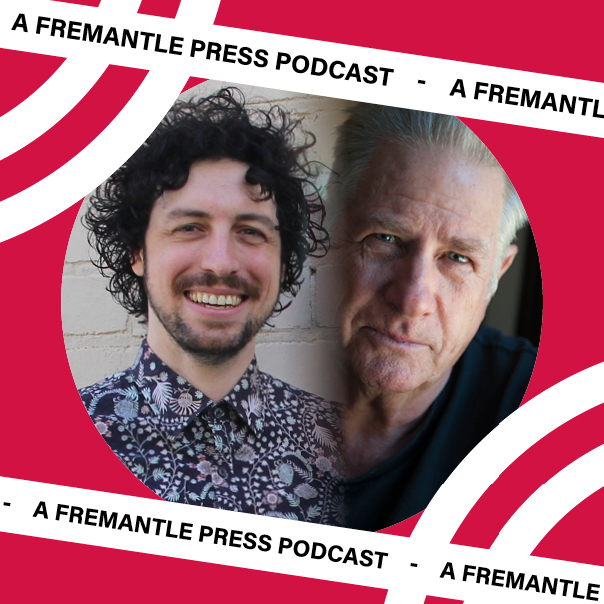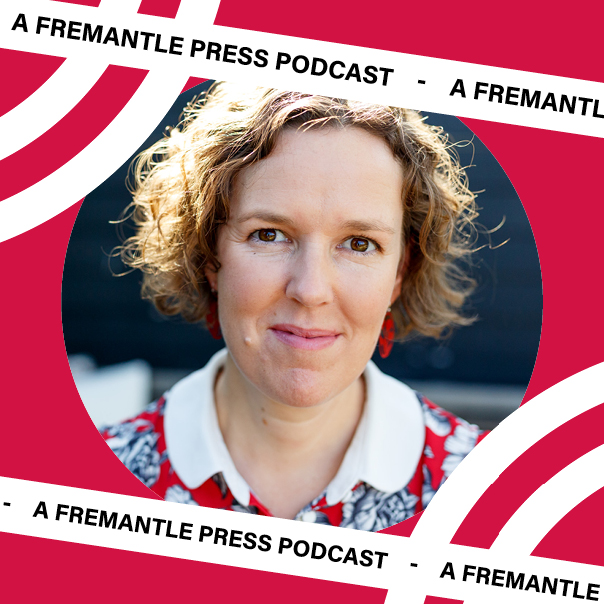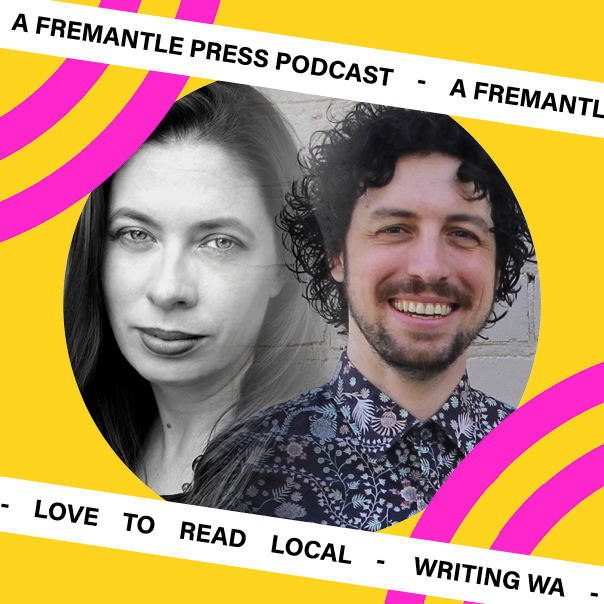Episode Transcript
[00:00:12] Speaker A: Hello and welcome to the Fremantle Press podcast. Today we are recording on Wallyalap in Wajak Noongar Bucha, and I'd like to acknowledge our first storytellers along with noongar elders, past and present.
[00:00:26] Speaker B: I.
[00:00:27] Speaker A: My name is Clare Miller and I'm here with fiction publisher Georgia Richter to introduce you to one of four writers shortlisted for the city of Fremantle Hungerford award. Hello, Georgia.
[00:00:37] Speaker C: Hi, Clare. This is a great time of year, isn't it?
[00:00:40] Speaker A: It's 2024 and we're ready for the next round of City of Fremantle Hungerford. Now, today's guest is Jodi Tez, whose manuscript is a novel called Screech. Georgia, describe why you chose this manuscript for the shortlist.
[00:00:55] Speaker C: Okay, Claire. Well, this novel really jumped out at us. It's a study in resilience and a story about the important alternative caregivers that someone might have in their life. And which you probably gauge from the novel's title, about the perspective that a pet can bring when all that a child wishes for and needs is to be able to belong.
The child's point of view in this novel is really refreshing, even though this is very definitely a novel for adults. So screech is funny and heartbreaking. A really insightful novel that's beautifully and satisfyingly resolved.
[00:01:33] Speaker A: So the wonderful Jodi Tez is a fremantle based musician. She's a writer, she's a high school english teacher and she's got degrees in sociology, music and education. A WAPA graduate and an award winning singer and songwriter, Jodie has performed nationally and internationally and she's appeared on ABC radio and triple Jenna. Now, in 2016, she was shortlisted for the Hungerford Award for her first manuscript, Barcarolla. And the following year she was accepted to the Eastern Frontier Writers residency on Norton island in Maine. And that was for her second manuscript. Wolf alumni for this residency included Booker Prize winner Kiran Desai. Jodie, welcome to the podcast.
[00:02:13] Speaker B: Thank you.
[00:02:14] Speaker A: An award like this is a really important milestone. What was it like to discover that you were shortlisted for the city of Fremantle Hungerford Award for the second time?
[00:02:24] Speaker B: Time?
[00:02:25] Speaker C: Yeah.
[00:02:25] Speaker B: Well, it was as thrilling as it was the first time, to be honest.
Screech is a completely different style of writing to what I've tried before and I really wasn't sure how it would be received.
When I heard that the judges found it, you know, quite impressive, I was really thrilled and I was kind of relieved as well.
I know that the Hungerford award is attached to some amazing writers in Fremantle and across Perth. And. Yeah. So I'm just thrilled to have any kind of association with that. Thank you.
[00:03:05] Speaker A: And tell us a bit about screech in your own words.
[00:03:08] Speaker B: Okay, so Screech is a coming of age domestic drama set in modern day Fremantle.
At the heart of the story is the concept that it takes a village to raise a child.
It is equal parts tragic and comic and it follows ten year old Bonnie and her pet bird, Screech, who's a cockatoo. And they've been best friends and inseparable since Bonnie was born. But nothing's been the same in Bonnie's world since her baby brother died. Her dad wasn't a drinker, her mum didn't stare at walls and Bonnie didn't zone out like she does now. But there's a diverse cast of wise and funny characters who try to shield her from the worst of what's really happening. And Screech explores the complex idea of family, the impact of childhood trauma, the cages that we sometimes choose to keep ourselves in and the human and animal need to belong.
[00:04:14] Speaker A: And we've asked you to do a bit of a reading for us.
[00:04:19] Speaker B: Yeah.
[00:04:20] Speaker A: What reading have you chosen?
[00:04:22] Speaker B: So I've chosen something, I believe from the start of chapter two, where we first really hear the voice of screech.
Screech calls Postie's here. Whenever he hears the postman's motorbike, he yells, get lost. Get lost. Get lost from his cage. When the neighbour's cat escapes and sneaks over. When guests come around, he says things like, who farted when someone lights a candle. He starts singing happy birthday. He says all sorts of things and they're never, ever random. He's no performing seal, just responding to commands. Like today, he's squawking my grandparents names. Bob. Rachel. Bob. Rach. I guess he's excited cause they're back in town.
Mum and dad have gone away for the weekend, so grandma and grandpa have come to look after me. They're making themselves at home, just as they should, this being their house and all. I was too when they retired and moved far away because city life was stressing them out. What's weird is where we live is not a busy, bustling city. In fact, the place we call the city is a 30 minutes drive away. We live in Fremantle, or frio, as everyone calls it. An easy, breezy port town full of pretty, happy people. It's got white, sandy beaches and lots of open space. It's got a river you can fish in or ride your bike around on weekends. There's always something cool going on. Farmers markets, outdoor concerts, plus a festival for anything and everything. I'm talking chilis, sardines, the Virgin Mary lights, lasagna, music, sculptures, beers, bicycles.
But grandma wanted a sea change and Grandpa wanted a tree change. So they moved to a town called Margaret river, or Margs, as everyone calls it, and bought a beach house surrounded by paper barks. They're only a three hour drive away, but I miss them a lot, so it feels like much further.
I sometimes wish they'd never moved, that we all lived together like we did in the old days. They're both heaps of fun, more like teenagers than grandparents, with all the mischief they get up to, all the energy they have. Grandpa still plays guitar in a bandaid. Grandma still swims in the nude. But they also know how to be serious when they have to. Like when they have to get serious with mum.
Their bedroom looks the same as it did when they lived here. Their patchwork quilt is still on the bed. Their funny looking undies are still in the drawers.
On top of their dresser is a photo from their wedding day. In it, Grandmas hair is short and Grandpa's hair is long.
They're both laughing really hard like they're gonna wet their pants. And Grandpa's passing grandma a cigarette that dad says isn't a cigarette.
The two of them visit us every few weeks and stay for three or four nights, but they hardly ever come when dad's in town. In fact, they're only here now cause mum called them crying.
She and dad have been fighting since the night of my birthday. Mum says they just need to get away for a while. I hope it's not me they need to get away from. I hope dad's nice to mum while they're gone.
[00:07:37] Speaker C: Oh, that was just beautiful, Jodie. Thank you.
[00:07:40] Speaker B: Thank you.
[00:07:40] Speaker C: And I think listening to that, it's so rewarding to hear it in your voice because it makes really vivid the voice of Bonnie, the ten year old narrator. But I'm also getting through that undercurrent of darkness that just trickles in so that she's quite light and breezy. But we're really getting a sense that things aren't right in a very subtle way. And that's so rewarding.
[00:08:02] Speaker B: Oh, that's great to hear because, yeah, I was hoping for that subtlety to find its way in. And it's nice to know that there are readers eyes on the page now, and it's coming across in that way.
[00:08:13] Speaker C: It absolutely is. I do have a burning question for you.
[00:08:17] Speaker B: Go ahead.
[00:08:18] Speaker C: How is it that you came to have a cockatoo as one of the main characters in your novel?
[00:08:24] Speaker B: Well, it's kind of a long story, but I'm very happy to share it. So I was on a morning walk and I was listening to Radio national when I heard an interview with a hilarious wildlife ecologist by the name of Doctor Gronu Cleary. And she was discussing australian birds, how they live very long lives, how they live in communities, and they care for each other and they suffer grief and loss, not unlike us humans. So I later did some research and I found that sulphur crested cockatoos can live upwards of 100 years if they're kept in captivity, and that there are records of one that lived to 119.
And when I learned that, I really got the story in my head, I pictured a pet bird that lived alongside two generations of one family and had the inside scoop on all of them. And then I thought, oh, I've got a really interesting vehicle for language here, because obviously cockatoos can speak, and I could weave subtext and backstory into the funny little things he said. And later readers would understand that he's kind of revealing a little bit more than perhaps he should.
[00:09:45] Speaker C: Beautiful. And I think Screech also helps us understand, as you were saying earlier, too, the metaphor of cages and entrapment. That is, the characters in the novel are caught in two. So that works very, very well.
[00:10:02] Speaker B: Brilliant.
[00:10:02] Speaker C: Now, we both know, you and I, how much time and passion goes into being a storyteller. So how long have you been working on this manuscript?
[00:10:14] Speaker B: So I've been working on this on and off for four years.
I do, because I'm a high school teacher, I do most of my writing in the school holidays. And I wrote the first draft of Screech, the entire first draft in a five week summer break. And I was really on a roll. And I had all these grand plans to finish the entire manuscript by the end of the year, except that when I started the new school year, Covid came along and teaching in a pandemic just completely derailed my focus. And then a little later after that, I renovated a house. So my focus was derailed a little more. But I'm now quite glad that it took me that long to write because lots of different things happened over that time and they kind of snuck into the way I wrote the story and things that happened to the characters and.
[00:11:11] Speaker A: The sense of being caged. I wonder if that came along as a result of COVID or was that there already, do you think?
[00:11:18] Speaker B: Yeah, actually, I probably did feed into it a little bit. You're right.
I think the idea of the cage really, it started off just knowing that, well, I've got a memory of a friend of mine who had a pet cockatoo when I was little and I just loved the idea of having a pet cocky. And I asked my mum if I could have one and at the time she told me, no way. It's really, really cruel, the idea of keeping a bird in a cage that could live for 40 years. And at the time, I actually thought it was a load of bologna. I thought she just didn't want to add to our menagerie, but. So when I found out that it actually was true and how awful it would be for a bird to be kept in a cage for that long, it just. Yeah, it just once again fed into that broader idea of the human experience.
[00:12:04] Speaker A: Of being caged and having been through that process of sort of stop start and being derailed as a writer and then coming back to the story again. Is there anything else that you would share with our listeners or perhaps other emerging writers?
[00:12:20] Speaker B: I think it is to just not give up. To understand that sometimes you can be distracted from a project just because life gets in the way and that, yeah, when the time is right and you do have the energy and you do have the focus, you can make it work. And certainly that's how it came about for me. I just found there was a period of time where I sort of had quite a few weeks in a row and I could really knuckle down and get the ideas and, yeah, it all came back to me. But it came back even clearer.
[00:12:53] Speaker A: Listeners, you can meet Jodi Tez at the 2024 City of Fremantle Hungerford announcement at Fremantle Art Centre on Thursday. The 24 October tickets are free and available now from the Fremantle Press website. I'm Claire Miller and I look forward to joining you in our next Hungerford podcast.


